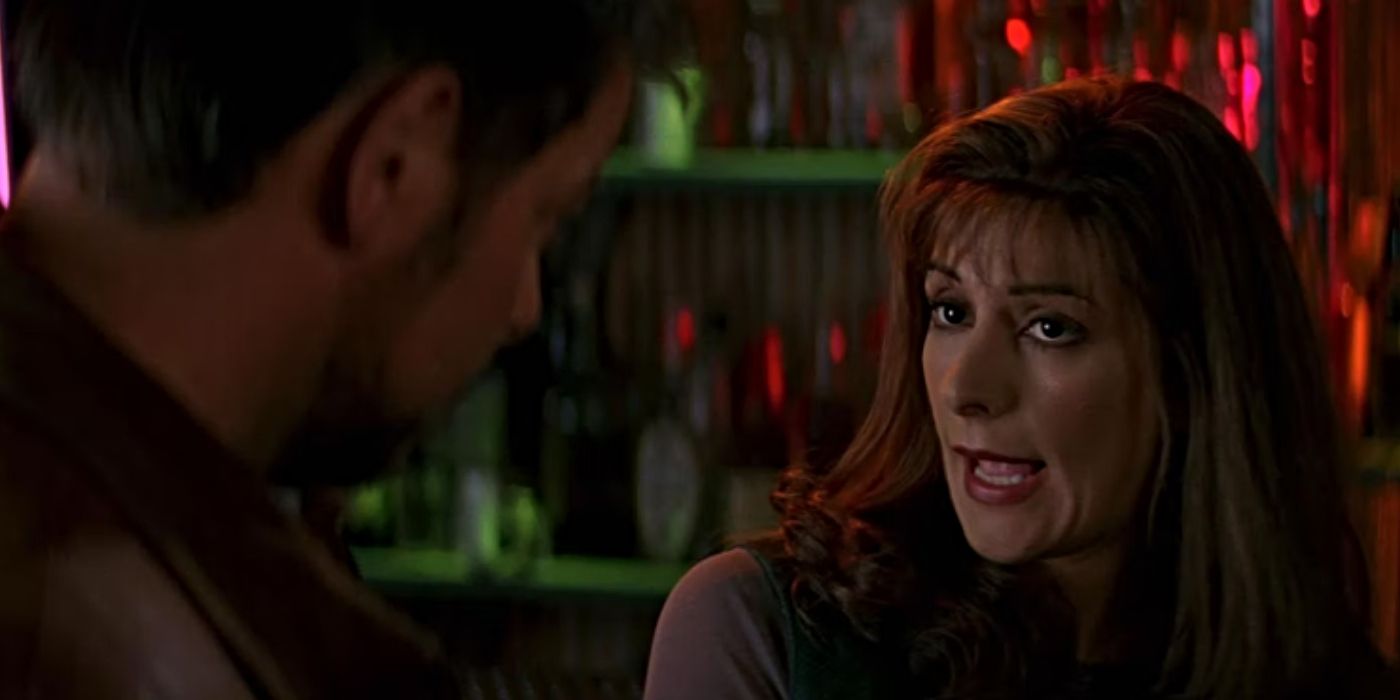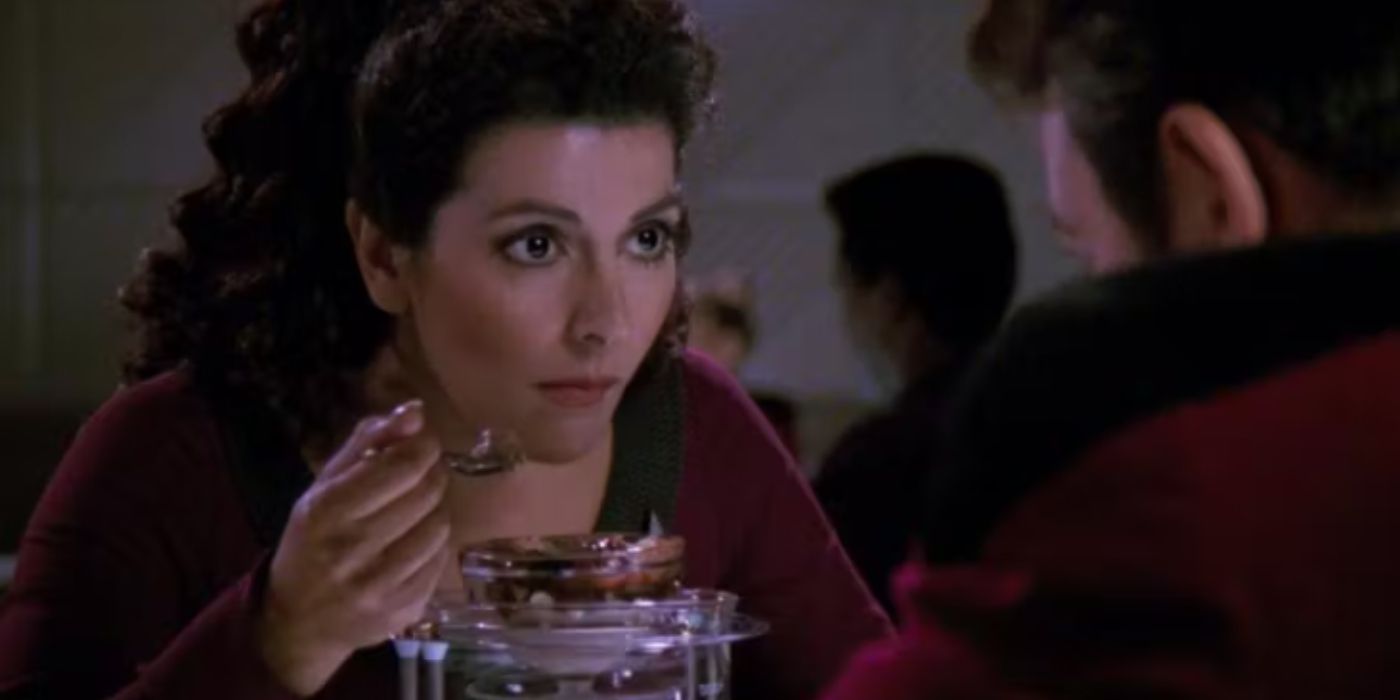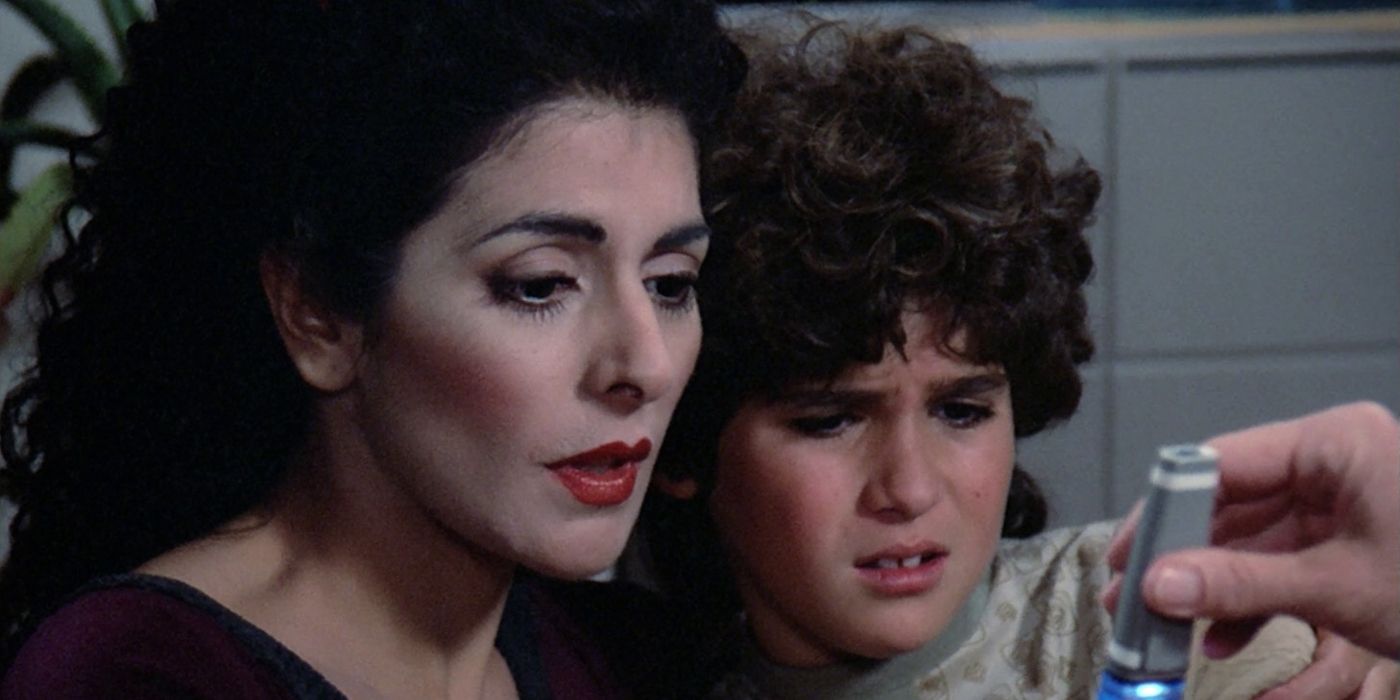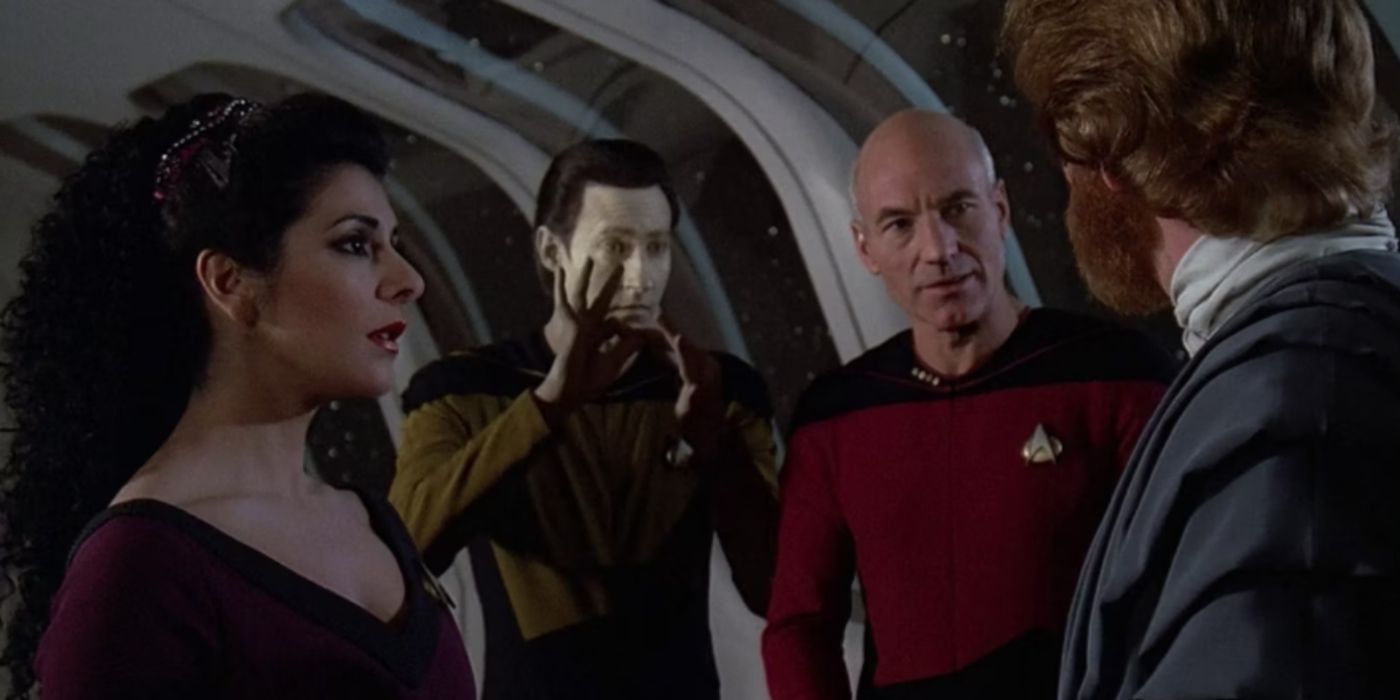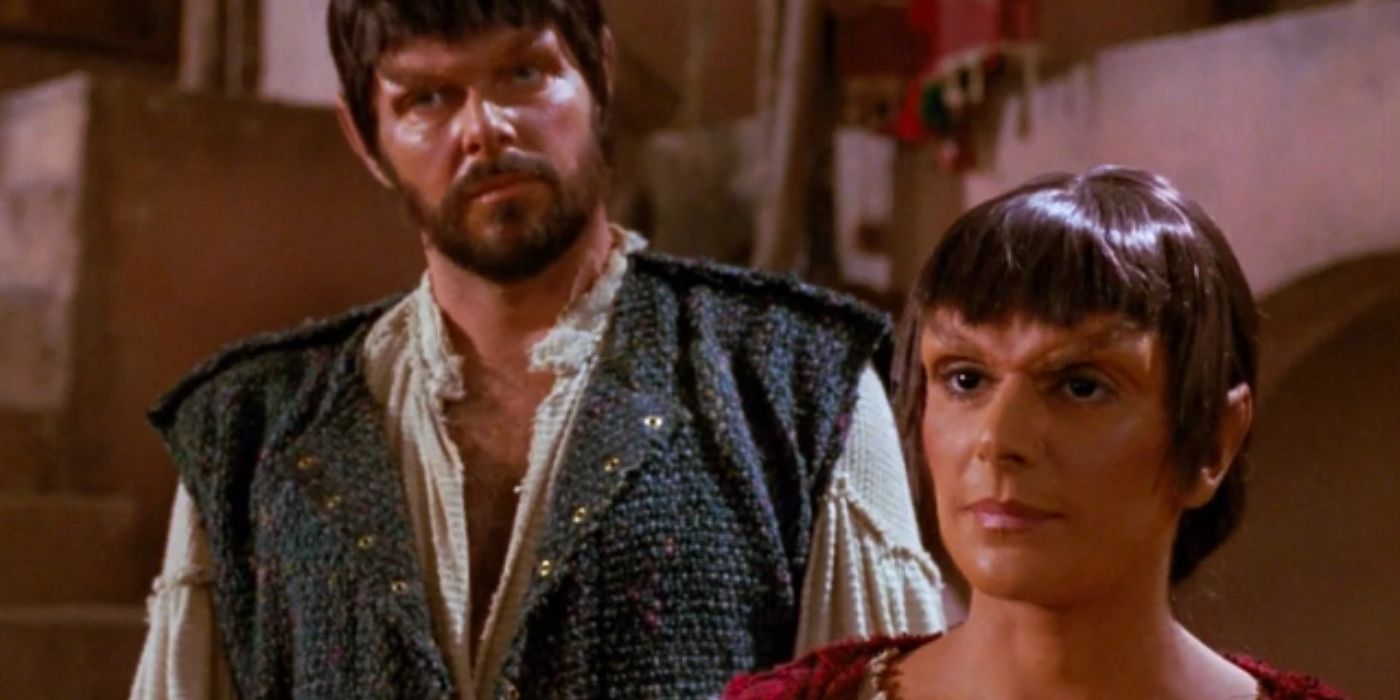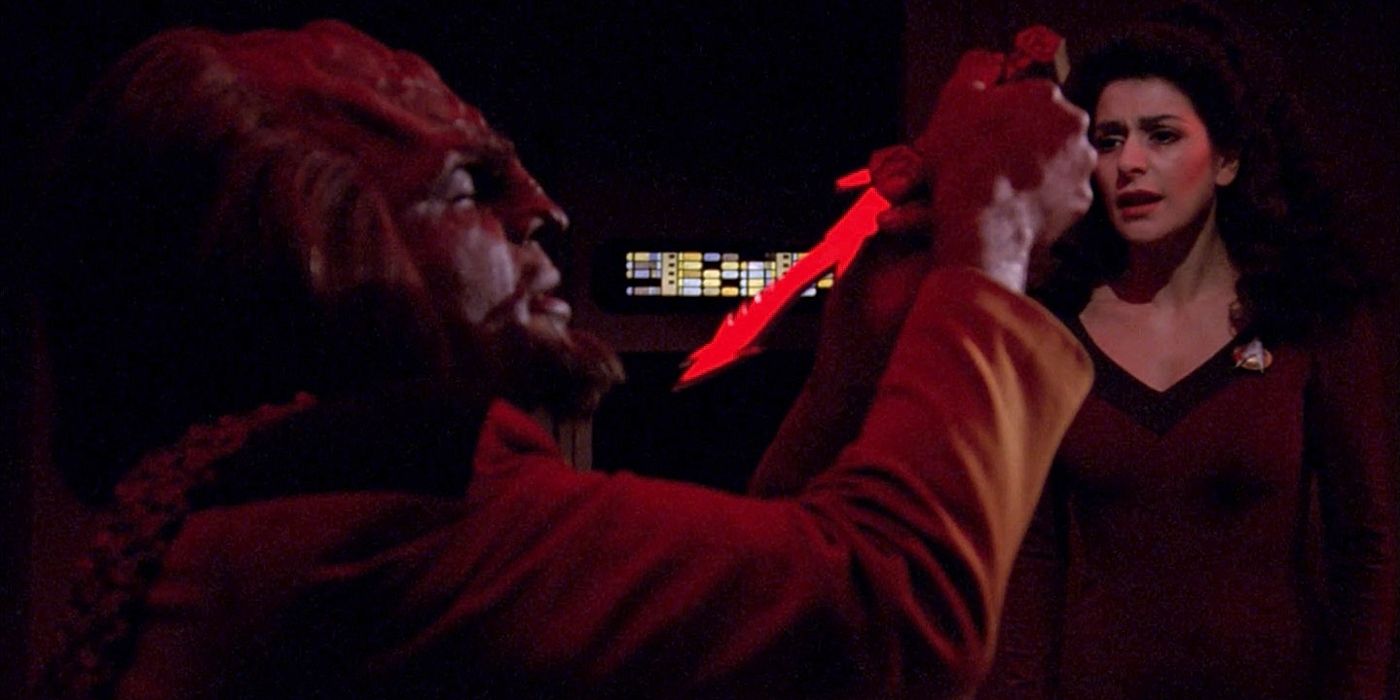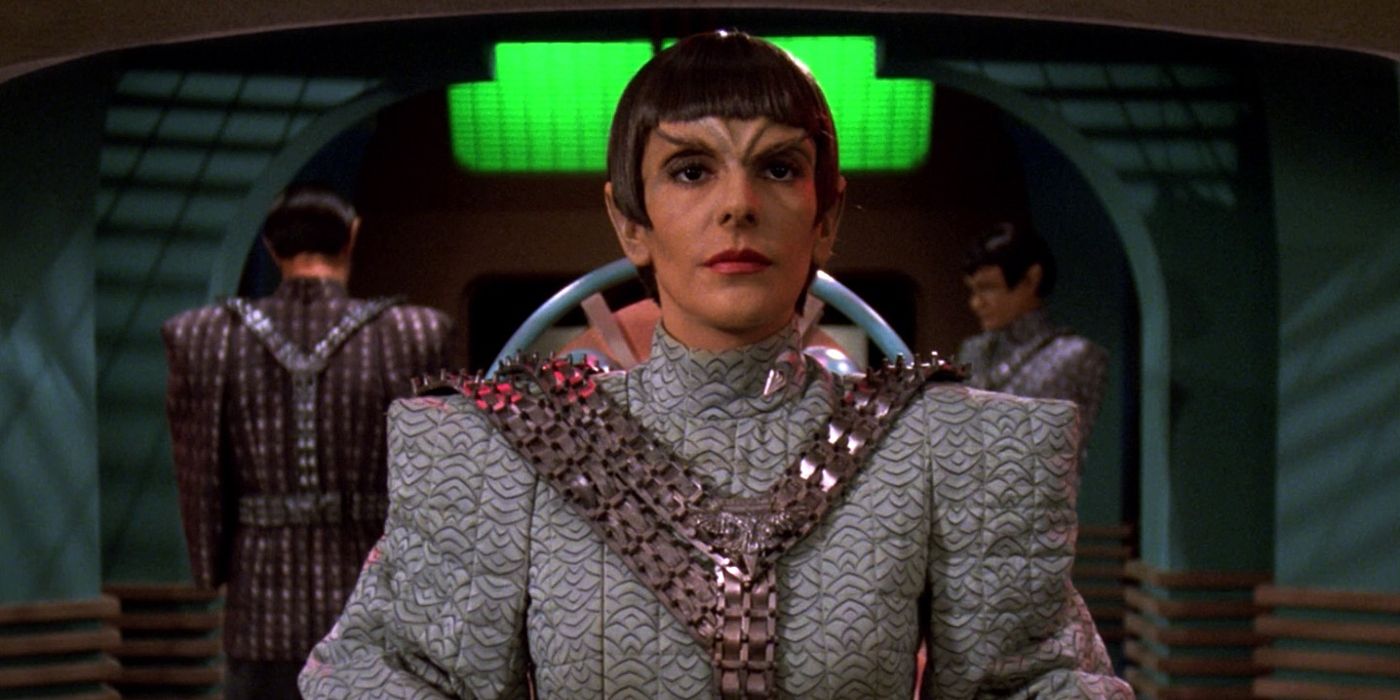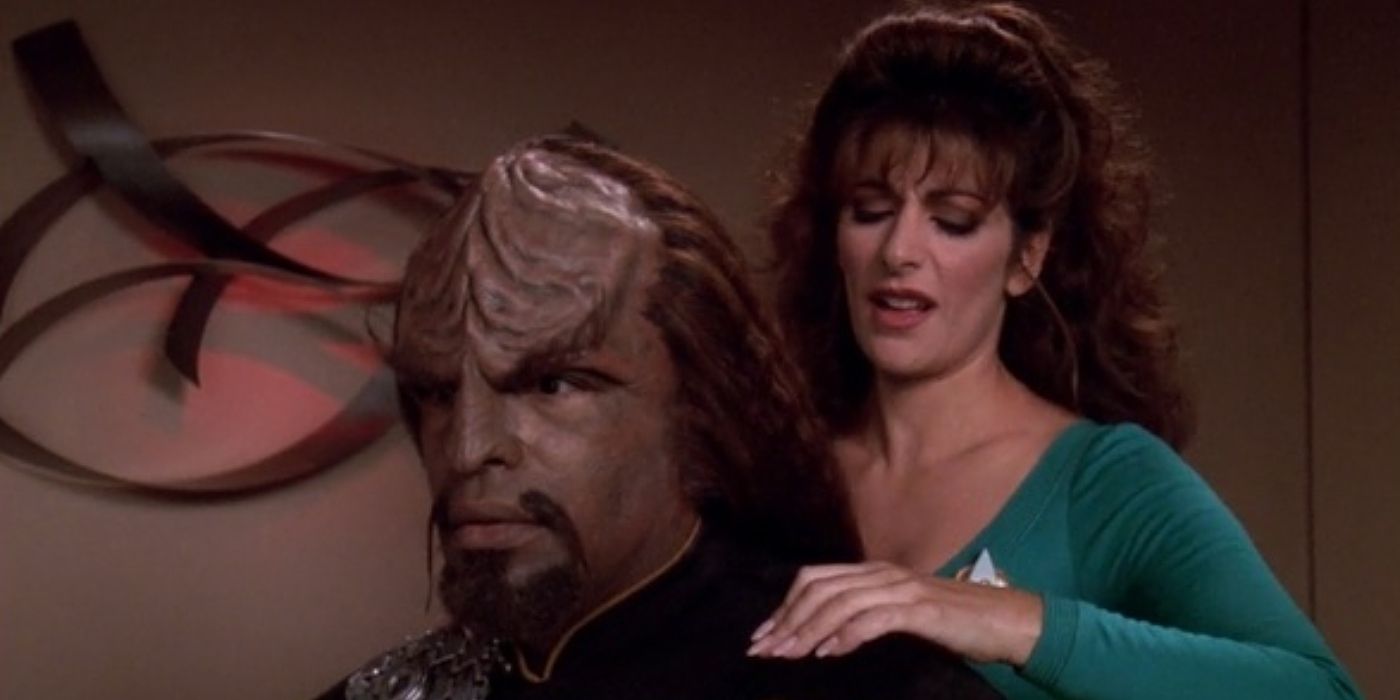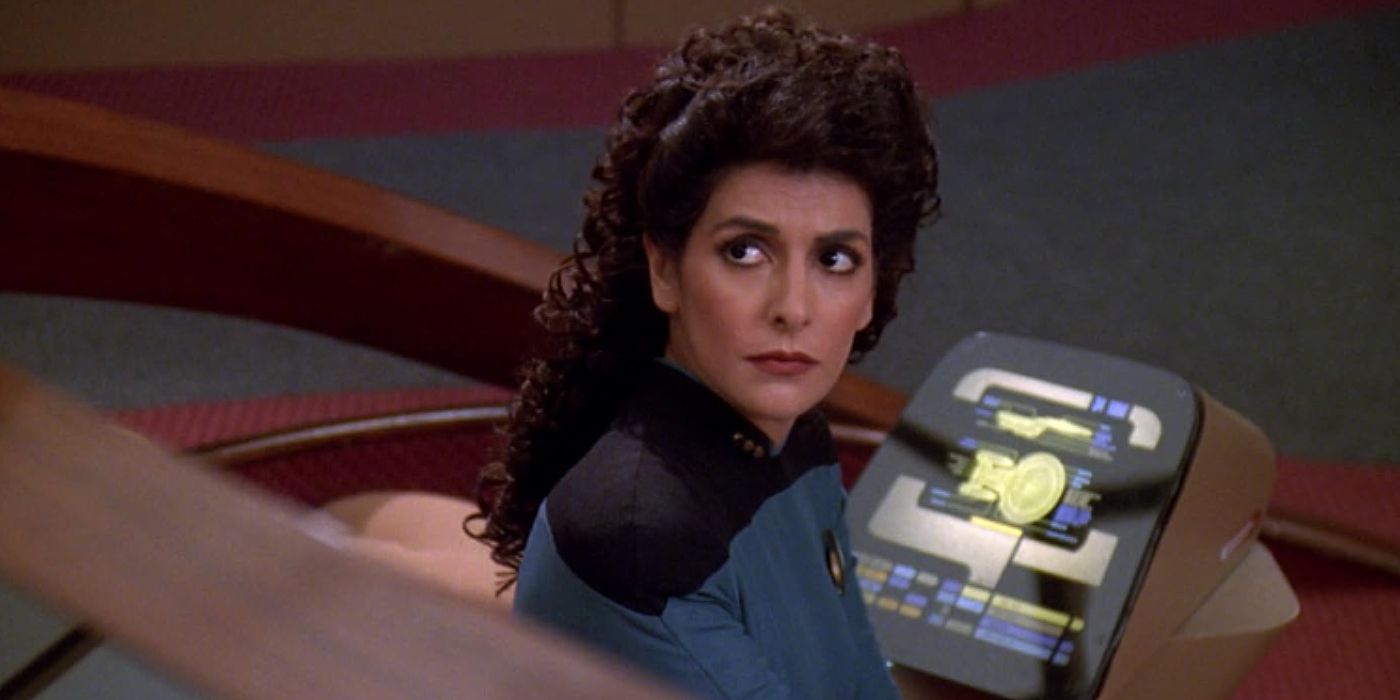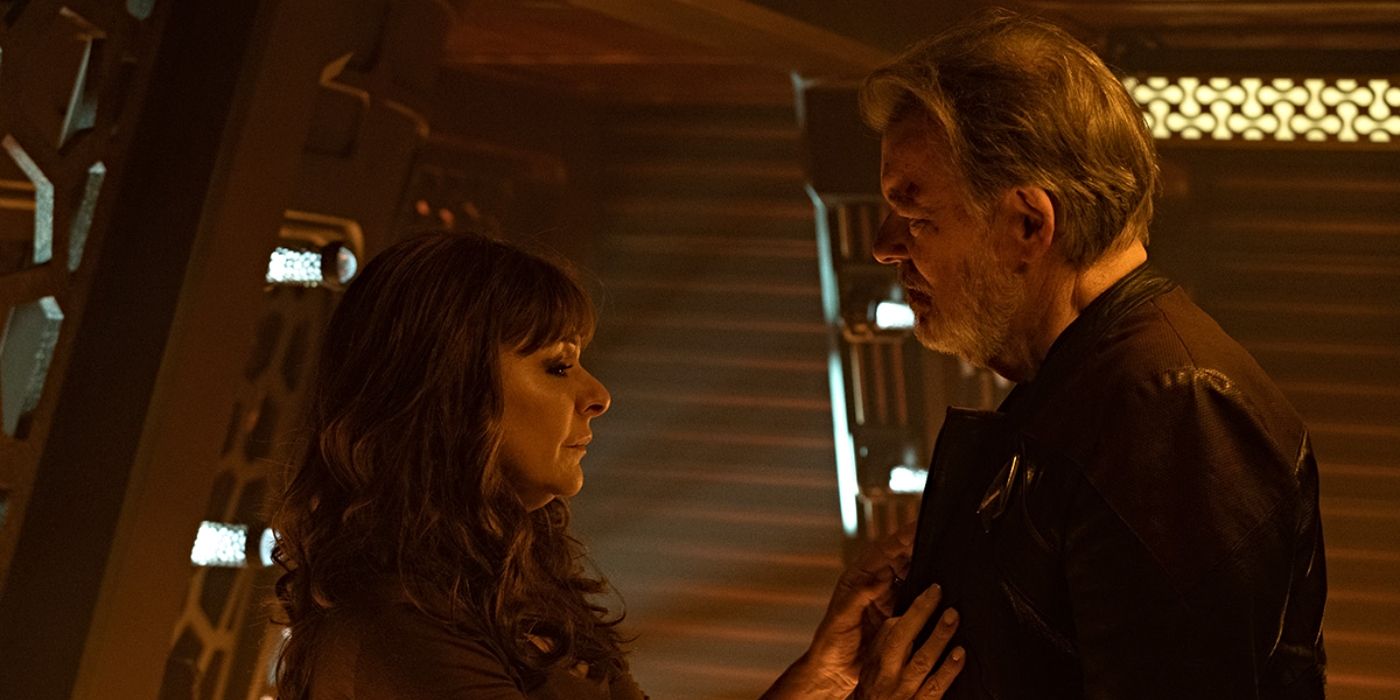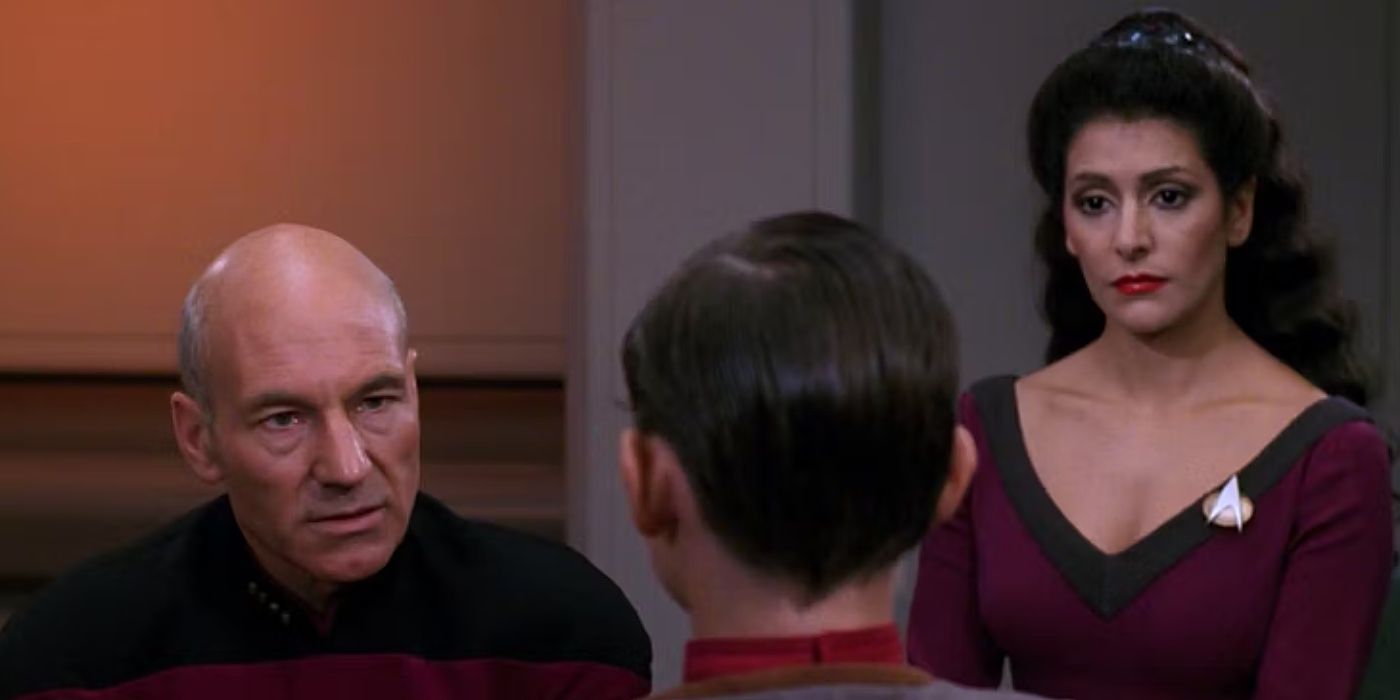The space opera franchise Star Trek has been diligently building its fan base since 1966, introducing and developing more and more complex characters who embody its philosophy of inclusivity, diversity, and humanism. The captains of starships and space stations may have gotten the most attention, but their crew members are an integral part of their peregrinations, joys, and tragedies and have also left their mark. One such beloved officer is Deanna Troi, infamous leotard included.
Portrayed by Marina Sirtis, the character debuted in Star Trek: The Next Generation’s (TNG) pilot episode, Encounter at Far Point, as Lieutenant Commander and Counselor aboard the USS Enterprise-D, the United Federation of Planets’ latest flagship. She is half-human, half-Betazoid, a humanoid species with large black irises from the planet Betazed, in the Alpha Quadrant, whose superpowers include telepathy and empathy.
Deanna is the daughter of Lwaxana Troi (played by Majel Barrett), a verbose and eccentric Federation Ambassador with an exasperating tendency to meddle in people’s personal affairs; therefore, the mother-daughter dynamic is generally tense and complex in many episodes, but it also provides much-needed comedic relief, and the chemistry between the actresses is on point.
Besides TNG and its subsequent films, Star Trek Generations, First Contact, Insurrection, and Nemesis, Sirtis reprised her role in three episodes of Voyager (VOY), in Enterprise’s (ENT) finale, and in Picard (PIC) and Lower Decks (LD). Here are some of Deanna Troi’s most memorable quotes from the franchise that best demonstrate her empathy, willfulness, determination, spontaneity, sarcasm, and playfulness.
16 “You know, there’s nothing wrong with a healthy fantasy life, as long as you don’t let it take over.”
Star Trek: The Next Generation – “Hollow Pursuits” – Season 3, Episode 21
The 21st chapter of TNG’s third season is among the funniest Star Trek episodes. It centers on the socially inept Lieutenant Reginald Barclay (Dwight Schultz), who has created a special Holodeck program as an outlet to ridicule the officers he is intimidated by and embellish and glorify the ones he is attracted to in various exaggerated simulations. Counselor Troi is among the characters Barclay obviously likes, as she has been treating his issues professionally.
In a classic case of transference, Barclay has highly sexualized Troi’s fantasy version, which shocks the unsuspecting officer as soon as she walks into the program. But, true to her mindful and empathetic nature, she gently tries to explain to her patient that a little fantasy is acceptable and even needed, as long as it doesn’t consume him and borders on obsession and disrespect.
15 “Timeline? Now is not the time to argue about time! We don’t have the time! What was I saying?”
Star Trek: First Contact (1996)
The Borg, a cybernetic army controlled by a manipulative Queen, are among the franchise’s most formidable opponents, abducting people from various species to assimilate them as their own and add their technology and knowledge to their collective hive mind. In the 1996 film First Contact, directed by Jonathan Frakes, who also plays First Officer William Riker, the crew of the USS Enterprise-E travels from the 24th to the 21st century through a temporal vortex to stop the Borg from assimilating Earth. They land on the day before the legendary Dr. Zefram Cochrane creates and operates a warp drive that grants starships super speed, thus enabling humans to come in contact with alien life.
Given her abilities, Troi is obviously among the landing party, and in her attempt to blend in with Cochrane and get him to trust her and spill information, she agrees to have some tequila with him, “the good stuff.” Riker finds them both drunk, and she tells him that they must clue Cochrane in about the Borg’s plan to stop him from achieving first contact. When Riker protests that in doing so, they would alter history and disturb the timeline, she argues with the aforementioned quote, one of the funniest in the franchise.
14 “If you’re looking for my professional opinion as ship’s counselor: he’s nuts!”
Star Trek: First Contact (1996)
Still in that same scene, Riker seems both amused and shocked by Troi’s uncharacteristic inebriety, but she asks him not to criticize her “counseling technique,” especially because Cochrane got a little too handsy with her.
When Riker wonders out loud whether Cochrane would be able to handle the truth, should they tell him what is really going on, she labels the eccentric genius “nuts” (something she would never normally do!), prompting Riker’s sarcastic reply, “I’ll be sure to note that in my log.”
13 “Dreams are the royal road to the knowledge of the mind.”
Star Trek: The Next Generation – “Phantasms” – Season 7, Episode 6
In TNG’s sixth episode from the seventh season, “Phantasms,” Lieutenant Commander Data, a synthetic lifeform with an impressive positronic brain played by Brent Spiner, starts experiencing strange nightmares straight out of a horror movie.
Citing Sigmund Freud, the Austrian neurologist who wrote “The Interpretation of Dreams,” Counselor Troi patiently explains to Data that dreams in general reflect the unconscious mind through symbolism and that he should embrace the experience. In doing so, she not only attempts to reassure the puzzled android, but also validates his sentience, as he has always aspired to emulate human behavior and customs.
In typical Troi insight, kindness, and levelheadedness, she also advises Data not to overanalyze every element in his nightmares, though.
Data:
Perhaps Dr. Freud was correct. The knife I dreamed about is the embodiment of my unconscious desire to inflict violence.Troi:
Data, even Freud said, “Sometimes a cigar is just a cigar.”
12 “It must be like staring in a mirror at a reflection you don’t want to remember.”
Star Trek: Voyager – “Life Line” – Season 6, Episode 24
The Emergency Medical Hologram, simply known as The Doctor aboard the starship USS Voyager, is truly a one-of-a-kind digital creation. He thinks very highly of his medical abilities, has an acerbic sense of humor, and aspires to better himself by adding disciplines like opera and the theater to his features.
Played by Robert Picardo, a prolific character actor who doesn’t get enough credit, The Doctor came from the genius mind of Dr. Zimmerman, who made sure he looked exactly like him. Unfortunately, they both share a highly inflated ego, so it’s no wonder they butt heads in VOY’s 24th episode from the sixth season, “Life Line.”
The Doctor asks to be sent 30,000 light years away to the Alpha Quadrant to treat his dying “father” and is horrified to find out that the latter considers his holographic model, the Mark I, only good enough for cleaning plasma conduits. They constantly argue and mock each other; consequently, Counselor Troi is asked to impart her professional wisdom on them. When she witnesses their obstinacy in person, she reminds Zimmerman, who is old and sick, that his anger and bitterness must stem from facing a younger and “healthier” version of himself in a model he considers obsolete and a failure.
11 “I never met a chocolate I didn’t like.”
Star Trek: The Next Generation – “The Game” – Season 5, Episode 6
In the sixth episode of the fifth season, amid an alien infiltration of the ship, Riker catches Troi digging into a bowl of “chocolate ice cream, chocolate fudge, and chocolate chips,” and asks her if she is depressed and if she’d like him to leave them alone. His familiarity stems from their romantic feelings for each other; naturally, her next move is naturally to hand him a spoonful of her dessert, which he declines, as he doesn’t like fudge. To which she retorts by expressing her unconditional love for all types of chocolate.
This scene makes her particularly relatable to viewers. Between the alien hostility she has to help manage and the therapy sessions with other crew members, Troi is bound to tap into her human side by indulging in the comforting decadence of chocolate and chocolate-based desserts, whether digitally replicated or not.
10 “Do whatever you feel is necessary to protect the ship and the crew. But know this: I’m going to have this baby!”
Star Trek: The Next Generation – “The Child” – Season 2, Episode 1
The season-two premiere of TNG is considered one of Star Trek’s most controversial episodes, as it features a non-corporeal entity impregnating an unsuspecting Troi in an attempt to experience an accelerated material life from gestation to maturity and death. Concerned about this new type of alien infiltration and the security risk it may pose, the crew proposes she terminates her pregnancy.
Though she didn’t give consent, her maternal instinct kicks in, and she refuses to comply, all the while acknowledging that the ship’s wellbeing is indeed primordial. She puts her foot down and firmly retorts that she will first see this pregnancy through, and only then will they decide what to do.
9 “Confidence is faith in oneself. It can’t easily be given by another.”
Star Trek: The Next Generation – “Loud as a Whisper” – Season 2, Episode 5
In TNG’s fifth episode from the second season, “Loud as a Whisper,” the Enterprise transports Riva, a deaf and telepathic mediator, and his loyal team of three interpreters to the war-torn planet Solais V to help with peace negotiations.
When the interpreters are killed, Data quickly learns sign language to communicate with Riva, but it’s obviously harder for the rest of the crew. Throughout the episode, Troi is particularly patient and understanding, remarking that any type of dialogue should be encouraged, and that people should have more faith in themselves first, in order to build a good rapport with others.
8 “That’s the problem with believing in a supernatural being… trying to determine what he wants.”
Star Trek: The Next Generation – “Who Watches the Watchers?” – Season 3, Episode 4
In TNG’s “Who Watches the Watchers,” the fourth episode of the third season, the crew travels to the planet Mintaka III to repair a Federation outpost meant to observe the primitive locals. They’re unfortunately discovered by them, and as is customary with remote races who aren’t familiar with technology, mistaken for all-powerful gods.
This quote echoes the franchise creator Gene Roddenberry’s own advocacy of secular humanism. Divine messages and religious beliefs are subject to interpretation and often divisive, and shouldn’t those in power and divine beings also be held accountable for their actions anyway?
7 “To admit that you’re afraid gives you strength.”
Star Trek: The Next Generation – “Night Terrors” – Season 4, Episode 17
In TNG’s 17th episode from the fourth season, the Enterprise gets trapped in a special anomaly that causes hallucinations in everyone except Data, Troi, and the wise El-Aurian barkeep, Guinan. Worf, the iconic honorable Klingon, is plagued with fear.
Worf:
I am no longer a warrior. I’m no longer strong. I… I feel…Troi:
What? What do you feel?Worf:
I feel fear.
After which, Troi reassures him that the first step to strength is acknowledging one’s apprehension, doubt, and limitations. Real courage isn’t blind; it’s being aware of the risks and seeing a task through anyway.
6 “In order to defeat your enemy, you must first understand them.”
Star Trek: The Next Generation – “Face of the Enemy” – Season 6, Episode 14
In TNG’s 14th episode of the sixth season, Troi is kidnapped by a Romulan first officer (When will Trekkies get a series exclusively from the Romulan point of view, incidentally?), and her features are altered to make her look like them. She is asked to pose as Major Rakal of the Tal Shiar, their infamous secret police, and make use of her empathic abilities.
When faced with the Federation as Rakal, Troi attempts to stall her Romulan crew members by calling for dialogue first before she agrees to “lower the shields” and “destroy them.” In stating her “strategy” out loud, she is also reminding herself that she should always put herself in people’s shoes and see things from their perspective, especially when dealing with a little-understood race like the Romulans.
5 “I can order you held for psychiatric observation – extended observation.”
Star Trek: Voyager – “Inside Man” – Season 6, Episode 7
In VOY’s sixth episode of its seventh season, Troi is yet again lending a kind ear to the socially-awkward Barclay, who has been ordered by Starfleet to take a leave. Barclay complains that his girlfriend, Leosa (Sharisse Baker-Bernard), left him on the day the groundbreaking holographic program he had developed for Voyager was tampered with.
They confront Leosa after learning that she is the culprit and has been working with a Ferengi to modify the program in order to get the nanoprobes of Seven of Nine, the former Borg drone who is now part of the Voyager crew. When Leosa defies Troi and claims she can’t prove anything, the latter uses her prerogative as a renowned and respectable counselor to threaten to throw her in a psychiatric ward — indefinitely.
4 “I know Klingons like to be alone on their birthdays. You probably want to meditate, or hit yourself with a pain stick, or something.”
Star Trek: The Next Generation – “Parallels” – Season 7, Episode 11
TNG’s 11th episode of the seventh season revolves around Worf, who, upon returning to the Enterprise from a bat’leth tournament on Forcas III, gets moved between several parallel universes. It also features romantic interactions with Troi, a subplot that has never sat well with the fans. Her gently worded sarcasm refers to the Klingon tendency to over-dramatize everything and their love of hard physical training, even on joyous occasions such as one’s birthday.
3 “Would you like to talk about what’s bothering you, or would you like to break some more furniture?”
Star Trek: The Next Generation – “Birthright, Part II” – Season 6, Episode 16
In TNG’s 16th episode from season six, Troi walks in on Worf exercising so violently that he has smashed his glass table.
Troi:
Did the table do something wrong?Worf:
No.Troi:
I’m glad you weren’t that hard on Ensign Lopez.Worf:
He made a mistake. The duty roster was inaccurate.
Troi then reminds him that it’d be better for him to confide in her about what is really bothering him instead of taking his frustration out on innocent furniture, which doesn’t actually solve anything. She always resorts to sarcasm when dealing with the people she cares about, especially if it’s a stubborn, temperamental, but well-meaning Klingon.
2 “I forgot the one thing that all counselors should remember. You can’t skip to the end of healing.”
Star Trek: Picard – “Surrender” – Season 3, Episode 8
Star Trek: Picard may have been met with mixed feelings, but at least it brought back beloved characters like Troi and Riker. They were now married but unfortunately lost their son, Thad, long before the show’s events.
In the eighth episode of season 3, Changeling and Borg threat aside, the couple, who has been going through a rocky patch while dealing with grief, have a poignant heart-to-heart, and Troi admits that she has been a little too hard on him, and that each person moves on from loss in their own way and at their own pace.
1 “We deal with our pain in many different ways. But over the years, I’ve discovered it’s in joy that the uniqueness of each individual is revealed.”
Star Trek: The Next Generation – “The Bonding” – Season 3, Episode 5
Speaking of loss, TNG’s fifth episode from the third season revolves around Jeremy (Gabriel Damon), the troubled young son of a recently killed crew member who can’t come to terms with this tragedy. Worf, who was also orphaned at a young age, wants to take the child under his wing, and Troi discusses with Captain Picard the best approach to handle the situation. The full quote is, “We deal with our pain in many different ways. But over the years, I’ve discovered it’s in joy that the uniqueness of each individual is revealed. If I can help a person back to a state of joy… well, my role has its rewards.”
Her compassionate, understanding, and giving nature shines through this quote, in which she expresses her dedication to helping every patient, regardless of age and character, without judgment.


